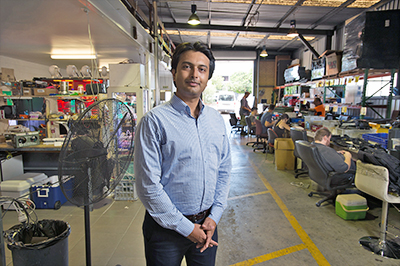Substation33 e-waste recycling ‘makerspace’ transforming lives
AN E-WASTE RECYCLING ‘hackerspace’ developed at Logan city near Brisbane has produced an extraordinary range of useful products including innovative road signs, ‘green’ bikes, affordable 3D printers.
But perhaps its greatest product of all is the improved mental health and well-being for its participants, who are largely from disadvantaged backgrounds, according to QUT researcher Dhaval Vyas. 
Dr Vyas is researching the effects of participation in such ‘makerspaces’ and has taken a special interest in outcomes generated by Logan’s social enterprise space, Substation33.
Substation33 was developed specifically for people from marginalised backgrounds to learn new skills – and Dr Vyas said participants openly report improvements in well-being, mental health and job skills
The anecdotal evidence has been confirmed in findings from a research study of Substation33 conducted by QUT Computer Human Interaction researcher Dr Vyas, who also recently received an Australian Research Council (ARC) DECRA award for the project.
“The ARC DECRA grant will enable an in-depth study of the benefits of do-it-yourself activities for people from low socio-economic (LSE) backgrounds at high risk of digital exclusion,” Dr Vyas said.
“The grant will be used to study other LSE hacker or maker spaces – a woodworks-based recycling makerspace and two crafts and sewing oriented making workshops.
“Traditional makerspaces are technology solution-focussed and cater for a more affluent group and often fail to provide benefits for LSE people.
“I’m investigating how the social and cultural nature of makerspaces enables creative and innovative work while supporting members.
“Substation33 members have designed and made innovative technology such as road signs for local conditions that record flood levels – which have been bought by the local council. They have also made green bicycles that run on refurbished laptop batteries.
“Members design and make 3D printers for their own use such as printing new battery packs for reclaimed and recharged laptop batteries, and DIY 3D printer kits for schools or for sale.”
Dr Vyas said design was normally assisted by professional designers, including user experience designers with mainstream, affluent users in mind.
“The creativity inherent in everyone is often left untapped or un-nurtured, especially in the members from LSE backgrounds,” Dr Vyas said.
“This project aims to uncover and explore design by a diversity of people from marginalised backgrounds, to make products that suit their own needs and ones they can commercialise.”
Dr Vyas said peer learning and interdependent teams were essential for integrating new Substation33 members.
“Relying on peer learning helps new members gain communication skills and different members have developed their own strategies for teaching and learning hacking skills,” he said.
“These organic socialising activities have resulted in improved mental health for members and a sense of community. They have described the experience of ‘pulling things apart’ as means to ‘let my anger and stress out’ and be ‘happy the whole day’.”
Dr Vyas said the Substation 33 study was part of a project that would take an ethnographic approach to investigate current practices of members of four makerspaces that involve people from marginalised backgrounds
The project would then engage participants in co-design workshops to develop ideas that fit their own needs and agenda.
“Through these activities, the project will develop new models and theories of creative making that can be applied in other environments,” Dr Vyas said.
ends

 How to resolve AdBlock issue?
How to resolve AdBlock issue?